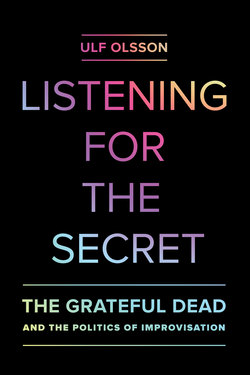Читать книгу Listening for the Secret - Ulf Olsson - Страница 10
На сайте Литреса книга снята с продажи.
ОглавлениеSeries Foreword
From the band’s inception, the Grateful Dead attracted critical attention ranging from insightful to sensationalistic. Often obscured by the media fanfare was the seriousness of the group’s project, although some of that early attention was thoughtful, appreciative, and even scholarly. As early as 1966, academics gravitated toward the band, attracted by the intelligence and accomplishment they heard. What was also clear was the depth of the band’s commitment, which became one of the hallmarks of the Dead, especially noteworthy in an industry substantially defined by brevity, novelty, and shallowness. Over the course of their thirty-year career, the Dead managed to build a remarkably devoted audience and earn an enviable critical reputation, in part by defying industry norms and expectations; they were often cited as an exception to almost every rule that defined popular music as a commercial enterprise. Yet the band’s artistic and musical ambitions made a deeper kind of sense, creating a perennial appeal that made the Dead one of the most durable concert draws and consistently one of the top touring acts in the country in their final years. Their caliber as songwriters, their commitment to improvisation, the breadth of their repertoire, and their enduring success made them exemplars, and helped to establish the band as a unique voice in American popular music and culture.
These attributes also have made the Grateful Dead one of the most studied bands in the academy. In addition to its depth and extent, the interdisciplinary discourse on the band is distinguished by the range of perspectives it encompasses, principally in the humanities and social sciences but extending into engineering and the sciences. The Dead were known for their live performances, thus it is fitting that much of the scholarly discussion about the band began with conference presentations, though many of the hundreds of those have been developed into articles, chapters, and books.
That work has achieved a level that now merits and can sustain more detailed and focused exegeses, which this series provides. The increasing sophistication of the scholarship on many of the contexts that the Dead’s achievement informs and entails—from the 1960s and the counterculture to many of the genres of music that the Dead’s work incorporates— highlights the band’s significance and makes plain the utility, and even centrality, of its example.
Academic work on rock music traditionally has challenged scholars on a number of levels, from basic issues of definition and demarcation to fundamental critical issues. Scholars continue to investigate a range of questions—from tradition and artistic intent to production and audience reception to cultural and historical dissemination—all framing an art form and informing a literature that show no signs of diminishing, even as they both continue to undergo drastic changes. The volumes in Studies in the Grateful Dead participate in and often directly address these contexts, offering readers a unique lens for illuminating and exploring the wealth of issues raised by one of the most enduring and significant phenomena in popular culture.
Nicholas G. Meriwether
